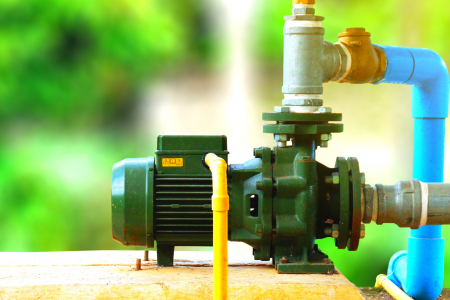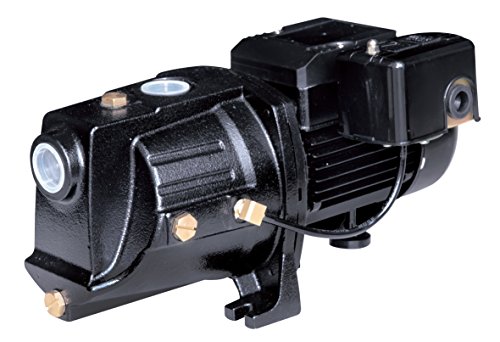A common question I hear is “how long does a well pump last”?
The average lifespan of a well water pump is 10-15 years. It depends on factors like well pump type, amount of sediment in you well water, and how long your pumps runs. Luckily, you can extend your pump’s lifespan by a few years through preventive maintenance.
If your pump is new and you wonder how long you’ll have it, or your pump is getting old and may need replacing, then this article was written with you in mind.
Read on to find out how long your well pump should last and what you can do to extend its life.
How Long Does a Water Well Pump Last?
Water well pumps last 10-15 years on average. But remember, your well should match the water pump to ensure maximum lifespan. There are three primary types of water pumps- jet, submersible, and centrifugal- and each works best for a specific type of well.
How long do jet pumps last?
The average lifespan of jet pumps is around 10 years. Jet pumps can be above ground with one line for shallow wells or two line for deep wells.
How long yours jet pump lasts depens on how well you matched your well to the pump. If you have a deep well with a high capacity needed, then a deep well or convertible jet pump will last longer.
Don’t be tempted to use a deep well jet pump with a shallow well as the strength of the pump may stir up sediment or silt in your well.
How you use your well water also matters. If you need to use sprinklers to water your lawn then you’ll need a high horsepower and high pressure deep well jet pump.
For your average well water needs then a 20GPM is usually enough.
- Provides superior performance and high capacities with more pressure for...
- Built-in overload motor, well injector kit included (well injector casting,...
- Dual Voltage- 115/230V (factory set at 230V); 1-14” suction, 1”...
- Motor features stainless steel shaft, heavy-duty bearings, balanced rotor,...
- Download the User Manual under the Technical Specification section of this...
How long does a submersible well pump last?
A submersible well pump can lasts 8-15 years on average. The biggest factor on how long a submersible pump lasts is the amount of sediment in the well, which can decrease the lifespan to 2 years in some cases. Other factors include motor quality and how long the pump runs.
But again, sediment will be the biggest determinant of your submersible pump’s lifespan. Since the submersible pump is in the well borehole itself, there could be a lot of sediment wearing down the moving parts.
Most submersible pumps are heavy duty and can handle the sediment in the well and still last at least 10 years. But it is important to check the grain size that the pump can handle.
This pump shown below has a capacity of up to 25 grains per square meter.
- Submersible Deep Well Pump.
- Made from Stainless Steel (including the outlet and the check valve).
- 2 Years Warranty.
- For 4" casings and greater diameter.
- Includes Control Box.
How long do shallow well (centrifugal pumps) last?
A shallow well pump is also called a centrifugal pump and is used above ground on wells with a high water table. These pumps generally last for 8 to 10 years as they don’t have much pressure put on them to perform.
It highly depends on how it’s used. For residential expect to get over 10 years and for irrigation a little under 10.
- 3/4 HP, maximum flow rate is 900 gallons per hour
- 1-1/4 in. Suction and 1 in. Discharge
- Dual Voltage motor (115/230V), factory wired for 230V
- Durable cast iron volute
- Two-years limited warranty
How to Extend the Life of a Well Water Pump
All of the above information is highly dependent on how well you take care of your water pump for wells. You can extend the lifespan by doing a few simple things.
Follow a Well Pump Maintenance Schedule
Regular maintenance of your well pumps will keep it running for years to come. Just make a schedule for certain procedures and stick to it every year.
- Clean the cooling fan – Debris can be caught up in the mesh surrounding the fan. Keeping this clear regularly will prevent your water pump from overheating.
- Check flanges for leaks – If you see any signs of water collecting around the pump then you need to see where it is coming from.
- Lubricate – Check your owner’s manual as this procedure changes from model to model. The bearings should be moving freely and require lubricating from time to time.
- Check seals for wear – O-rings and gaskets tend to dry out and eventually crack. Keep an eye on these and replace when they seem to be crumbling.
- Call a technician – Once a year you should have a professional come and do some routine servicing on your well pumps.
Get the Right Size Water Pumps
Having a well pump that is too small or not powerful enough for your water needs is going to put it in an early grave. Likewise, a water pump that is too big can stir up sediment that will eventually wear down the parts in your pump causing it to die young.
Make sure you check the GPM that it is capable of, how deep the well can be and what size pipe they need. Horsepower should be high for deep wells and lower for shallow wells.
Add a Pressure Tank
I think every well owner needs a pressure tank. Having one reduces the need for the water pump to cycle as long and also to turn on and off too frequently.
Since the pressure tank helps regulate pressure and delivers water at a set rate, it helps to control how often the pump is on.
Generally, you want your water pressure to the house around 40 to 60psi. When the water is turned on the pressure drops. Once the pressure in the tank hits the lowest setting, it turns the water pump on to fill the tank back to full.
Without the pressure tank, the water pump is cycling on and off 24 hours a day and will lead to burn out.
- 3/4 HP, maximum flow rate is 900 gallons per hour
- 1-1/4 in. Suction and 1 in. Discharge
- Dual Voltage motor (115/230V), factory wired for 230V
- Durable cast iron volute
- Two-years limited warranty
Install a Check Valve
A check valve is a primer that keeps your pump filled with water. This relieves the pressure needed for suction. The less power the pump needs to suction the water, the longer the motor will last.
There are different types from spring loaded to poppet-style. It’s important to check with your owner manual for the type that works for your specific model.
Factors in your Well Pump Life Expectancy
There are many factors that affect your well pump life expectancy. For example, a pressurized well tank will extend the life of your well pump.
Furthermore, not all well pumps are the same. Some last longer than others. And not all wells are the same either. How long your well pump will last depends on the type of well, too.
In this section, I will highlight some of the factors that determine how long your well pump lifespan could be.
Wondering what to do if a well pump freezes? Read this article to find out.
Water Pump Duty Cycle
How long a water pump needs to run per day is one of the biggest factors in its life expectancy.
If your pump is running continuously all day then eventually the wear and tear will catch up with it. And, if the pump is cycling on and off frequently, then that also affects its lifespan.
In either scenario, the water pump is heating up and will lead to a failure sooner rather than later.
A captive-air bladder-type water pressure tank is essential if you want your water pump to live a full life. With the pressure tank, the pump only runs long enough to fill the tank and then shuts off.
- Quick Connect, Replaceable air cell assures easier field servicing.
- Greater drawdown than comparably sized steel tanks yields greater...
- Extended labor warranty option is available to homeowners.
- Won’t rust in corrosive environments, particularly important in coastal...
- Quicker and less costly to install, usually requiring only one person and...
Horsepower or Motor Size
How much power your well pump has also has an effect. A smaller horsepower pump has to work much harder than a bigger one to extract the water. This struggle heats up the motor and leads to parts wearing out.
A pump with a horsepower of ¾ up to 1HP is recommended even if it seems like it may be more than you need. If your well water level gets low due to drought or other factors, then you’ll need that extra horsepower.
In case you lose power, this is how to run your well pump on a generator.
Pump Motor Quality
Any motor is only as good as the individual parts it is made from. A water pump made with a cast iron body will last longer than one made with inferior metal. The bearings should be stainless steel and there shouldn’t be any aluminum used in the parts or casing.
You get what you pay for so going for the cheapest pump is not always the best idea.
Water Sediment
If you have a lot of sediment in your well that enters the pump, then this will severely impact the lifespan of even the best well pump. The sand acts like sandpaper and will wear down the bearings and moving parts very quickly.
I’ll go over some of the ways to prevent sediment from ruining your pump further down in the article.
Well Pump Capacity
Each well pump is designed to work within a certain threshold of water flow rate. If you are asking your pump to handle more than it is designed for, it will struggle and eventually fail.
Make sure you understand how many gallons per minute you are using at the peak time of day. If your pump is showing signs of problems, then check the manual to see what the GPM is and what you are currently asking it to do.
The pipe size will also put a strain on the motor of the pump if the diameter is too low. A narrow pipe means that the pressure to pump the water is higher. A high-pressure pump is required if the pipe is narrow.
FAQ About Well Water Pump Lifespan
There are so many factors that it needs its own article.
If you are having problems drawing water, it could be your water pumps are old, has some problems, or it could be other parts of your well. You’ll need to check your well water level, the pressure tank and all the electrical connections to the pump to determine if you need a new well pump or if it just needs servicing.
For shallow wells, it could cost anywhere around $1,000 for the new pump plus the cost of installation. A deep well increases the price. Expect to pay around $2,000 for a well with a depth over 100 feet.
Once you are around the 8 year mark of having a pump, then start looking for signs that it is getting old.
You can get a few more years depending on the type of pump but if you see signs like the pump is cycling often or you get poor water pressure, then it pays to have it inspected to determine if you need a new one.
Keeping your pump serviced and maintained will make your water pump last through the years.
If your pump is short cycling then it is likely the pressure tank. If your tank is older and doesn’t have a bladder then this is surely the reason. Your pressure tank may need cleaning or replacing.
Wrapping It Up
Keeping a well operating efficiently is every owner’s top priority. The crux of it is your pump. It is one of the downsides of well water vs city as it requires upkeep.
Knowing how long a water well pump lasts and how to keep it running is one of the most important things to learn. Which is why we always recommend adding a pressure tank as well.

Nick Lopresti is the founder of YourH2Home and a home improvement expert. He has years of experience writing about various home improvement topics, mostly as it pertains to water systems.




